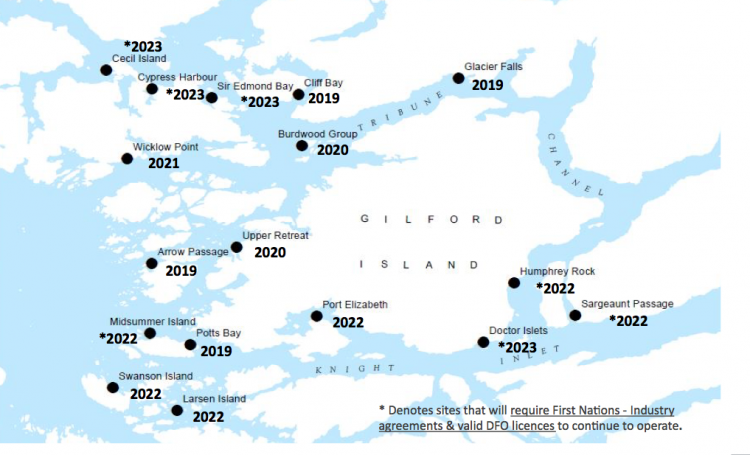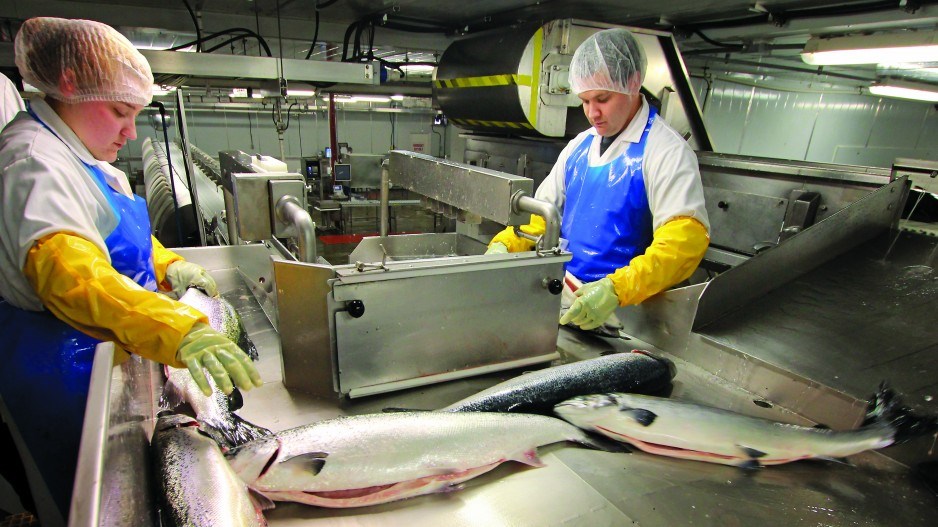Four salmon farms in the Broughton Archipelago will be shut down by the provincial and federal governments in 2019, and another 13 could be phased out by 2023.
In a joint announcement Friday December 14, provincial and federal governments, First Nations representatives and two fish farm companies, Cermaq and Marine Harvest, addressed an agreement that will see up to 17 salmon farms in the Broughton Archipelago phased out by 2023.
"The plan that we're announcing today will mean the closure of 10 farms in the Broughton over the short-term that will create that safe migratory route, that corridor for young salmon that was mandated by the Cohen Commission," said Premier John Horgan.
Some of the 17 salmon farms in the area might be able to stay but only if the companies operating them can get First Nation consent.
Of the four farms to be permanently shut down in 2019, two are fallow, said Jeremy Dunn, public affairs officer for Marine Harvest. The company is not expecting job losses, since the plan is to maintain current production levels by shifting some production to other existing fish farms that are not in the Broughton Archipelago, where about 25% of the company's operations in B.C. operate.

Both the federal and provincial governments plan to remove those sites which are directly along wild salmon migration routes. In the coming years, the federal government plans to invest in research and development aimed at addressing the technological and commercial barriers that have, to date, prevented land-based, closed containment salmon farming from being commercially viable.
Salmon farming in B.C. is a $1.5 billion industry that employs roughly 1,600 people, many of them First Nations.
But First Nations in the Broughton Archipelago, where salmon farms are most highly concentrated, have been increasingly vocal about their opposition to the industry. Their concern is that they are having a negative impact on wild stocks, since wild salmon migrate past the farms.
One of the biggest concerns is that they could be picking up diseases and sea lice from salmon farms.
Bob Chamberlain, vice president of the Union of BC Indian Chiefs, who has been fierce opponent of salmon farms, thanked Cermaq and Marine Harvest for cooperating in the effort to address concerns of First Nations over fish farming.
"What I kept hearing from you time and time again, and we heard from the province time and time and again, is the concern for the people that have employment," Chamberlain said. "So we had to strike a balance between the needs of our people and the needs of industry, and I believe we have done that expertly."
Representatives from Cermaq and Marine Harvest were surprisingly upbeat over the prospect of their salmon farms being shut down.
"We look forward to working closely with you in partnership to ensure the health of our wild salmon while creating good jobs and opportunities and feeding future generations," said David Kiemele, managing director for Cermaq Canada.
When the NDP government was first elected, one of the first things it did was put the fish farming industry on notice that its days might be numbered in B.C. Provincial Agriculture Minister Lana Popham sent a letter to Marine Harvest in 2017 warning the company that it would need to get First Nation consent to continue operating in the Broughton Archipelago, or its leases would not be renewed.
Diane Morrison, managing director for Marine Harvest, said the plan that has been developed by the two levels of government and First Nations gives her company some certainty.
"There's been a lot of uncertainty over the past year regarding the future of the farming tenures in the Broughton, and this plan announced today...will give us all knowledge of the path forward," she said.
The plan announced Friday includes independent monitoring and oversight of fish farms by First Nations, and wild salmon habitat restoration.
Friday's announcement follows an announcement earlier this week of a new federal plan for aquaculture in Canada.
"These initiatives included reviewing alternative technologies for aquaculture, including a study of land and sea-based closed containment technologies," said federal Minister of Fisheries and Oceans Jonathan Wilkinson.
He said it also includes moving to an area-based management system "to ensure that local, environmental and social factors are taken into consideration when identifying potential areas for aquaculture development."




